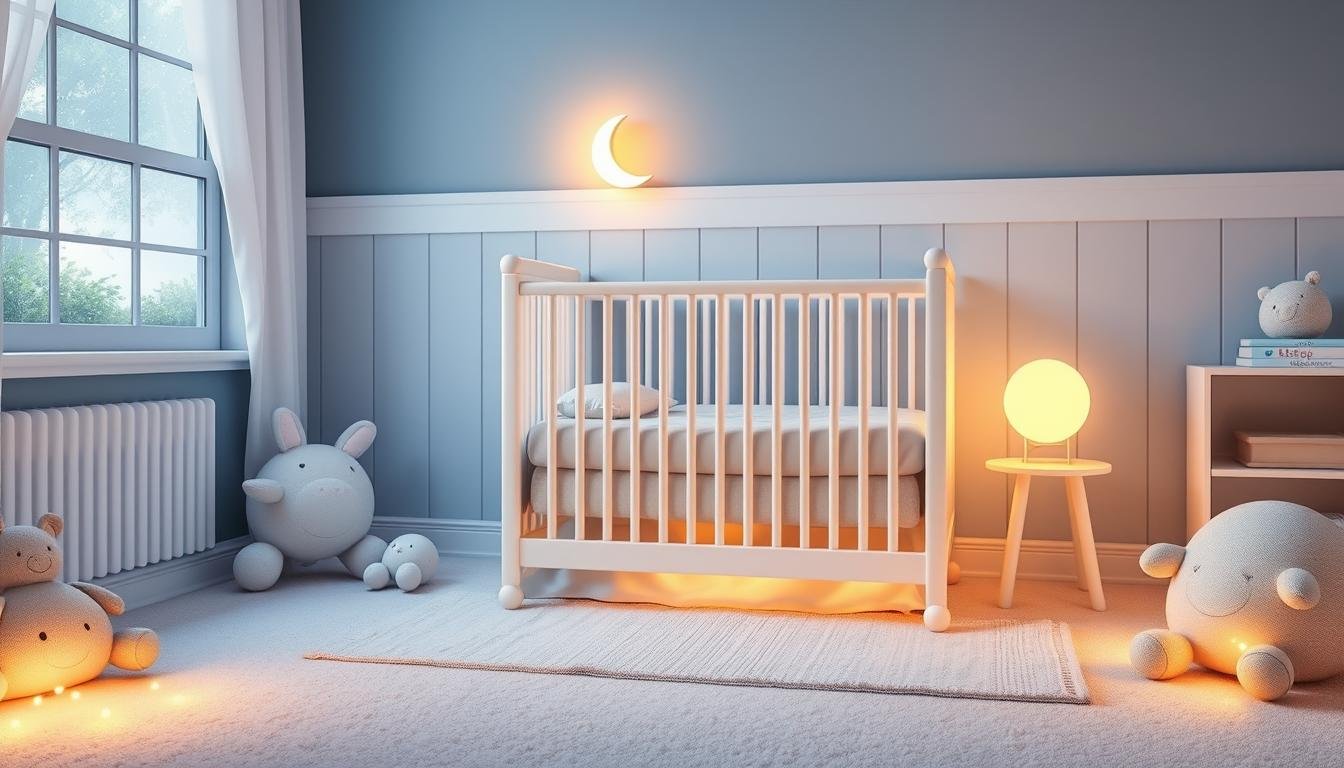As a new parent, making sure your baby sleeps well is key for their health and growth. Babies spend a lot of their sleep in the dream stage, or REM sleep. This stage is important for their brain, helping with memory and self-control.
Newborns sleep a lot, but in short bursts. They might not have a regular sleep pattern at first. But as they get older, they start to sleep more at night and nap less during the day.
Experts say your baby should sleep in your room for at least six months. But they should always sleep in a crib, bassinet, or other safe place. This keeps them safe from the dangers of adult beds.
By setting up good sleep habits and a soothing bedtime routine, you can help your baby sleep well. This ensures they get the rest they need to grow and develop.
The Importance of Healthy Sleep for Babies
Healthy sleep is key for newborns. It’s when their brain works the most during this important time. Babies spend half their sleep in REM, which helps with memory and self-control.
Understanding Baby Sleep Cycles and Patterns
Newborns sleep a lot, up to 12 hours a day. But they only sleep for an hour or two at a time. It takes a few weeks for them to sleep longer.
By 3 months old or weighing 12 to 13 pounds, most babies sleep through the night. They sleep for 6 to 8 hours without waking up.
The Impact of Sleep on Brain Development
Good sleep is essential for a baby’s brain. It helps with learning and emotional control. Bad sleep can lead to problems later on.
Starting healthy sleep habits early is good for a child’s future. It helps them stay well and happy.
Establishing a Consistent Sleep Routine
Creating a consistent sleep routine is key for your baby’s better sleep. [https://www.webmd.com/parenting/baby/newborns] Experts say start a bedtime routine at 6-8 weeks. A calming ritual signals it’s time to sleep.
Creating a Calming Bedtime Ritual
Activities like gentle massage, reading, singing, or a warm bath can calm your baby. Keep the room quiet and dim the lights. Avoid stimulating activities before bed. Putting your baby down awake helps them learn to fall asleep alone.
Encouraging Self-Soothing Habits
- Swaddling soothes babies, but stop at 4 months when they start rolling over.
- Pacifiers help with self-soothing, but wait a few weeks if breastfeeding.
- Consistency in bedtime routines helps babies sleep better and self-soothe.
As your baby grows, adjust the bedtime routine as needed. [https://www.webmd.com/parenting/baby/newborns] A consistent sleep routine and self-soothing habits support better sleep and development.
Safe Sleep Environment for Your Baby
Creating a safe sleep space is key for your baby’s health. Experts say room-sharing for the first six months is best. [https://pmc.ncbi.nlm.nih.gov/articles/PMC2724136/] This can cut SIDS risk by up to 50% compared to bed-sharing or separate rooms.
Room-Sharing vs. Bed-Sharing
Room-sharing is good, but bed-sharing is not safe. Adult beds can be dangerous for babies, with risks of getting trapped or suffocated. So, place your baby’s crib or bassinet near your bed for safety.
Ensuring a Safe Sleep Surface
- Use a firm, flat mattress with a tight-fitting sheet for a safe sleep area.
- Avoid soft items like pillows, blankets, or cushions to lower suffocation and SIDS risks.
- Stay away from products like weighted sleepers, swaddles, or blankets, as they’re not safe for baby sleep.
By focusing on a safe sleep environment for babies, you can lower the risk of sudden infant deaths. Keep the sleeping area free from hazards and follow guidelines for room-sharing vs. bed-sharing and ensuring a safe sleep surface for your baby.
How to Help Your Baby Sleep Better Every Night
Getting a good night’s sleep is key for your baby’s growth. By noticing their sleep cues and using gentle ways to calm them, you can help. This way, they’ll sleep well and wake up feeling fresh.
Recognizing Sleep Cues
Watch for signs your baby is tired, like rubbing their eyes or yawning. When you see these, it’s time for bedtime. By noticing these cues, you can help your baby relax and sleep better.
Soothing Techniques for Fussy Babies
For a fussy baby, try gentle soothing methods. Swaddling can make them feel safe and calm if they’re under 4 months. Rocking, shushing, or playing soft music can also calm them down.
If your baby cries after being put down, don’t pick them up right away. Let them try to soothe themselves and fall asleep alone. This helps them learn to sleep on their own.
By noticing your baby’s sleep cues and using soothing techniques, you can help them sleep better. This supports their health and growth.
Swaddling: A Gentle Embrace for Better Sleep
Swaddling, the ancient art of wrapping a baby in a light blanket, can be a true sleep saver for new parents. It recreates the snug confines of the womb. This helps infants feel secure and relaxed, key for better sleep.
Research shows swaddling can lead to longer stretches of sleep for babies. It helps them transition from the womb to the outside world with ease. Proper swaddling also supports healthy hip development and may reduce the risk of Sudden Infant Death Syndrome (SIDS) by keeping babies on their backs during sleep.
To effectively swaddle your little one, use a breathable fabric like cotton or bamboo. Avoid wrapping too tightly. The ideal swaddle allows for natural hip and leg movement while keeping the arms snugly secured. Watch for signs of discomfort, such as sweating or rapid breathing, and adjust the swaddle as needed.
Swaddling is generally recommended from birth until around 3-4 months of age. Or until your baby starts showing signs of rolling over. At this point, it’s time to transition to a wearable blanket or sleep sack to allow for freer movement during sleep.
With the right technique and timing, swaddling can be a game-changer for swaddling for better baby sleep. It creates a cozy, womb-like environment. This simple practice can help your little one drift off to dreamland more easily and enjoy benefits of swaddling for infant sleep.
White Noise: Nature's Lullaby for Babies
Getting quality sleep is key for a baby’s growth. White noise, like a fan’s hum, can help. It blocks out loud noises and makes a peaceful space for sleep.
Benefits of White Noise for Infant Sleep
Studies show white noise helps babies sleep better. In one study, 80% of newborns fell asleep in just five minutes with it. It also helps preterm babies gain weight and cuts down crying in colicky babies.
White noise calms babies, lowering heart rates and boosting oxytocin levels. But, keep the volume low, under 50 decibels, to avoid hearing damage.
Parents often use white noise or music to help their babies sleep. The American Academy of Pediatrics suggests placing machines at least seven feet away. The sound should not be over 50 decibels.
White noise is great for baby sleep, but there are downsides. It can be hard to sleep without it when traveling. Weaning a baby off it might take time, slowly reducing the volume.
Signs of Overtiredness and Sleep Deprivation
It’s important to know when your baby is overtired. Look for signs like yawning a lot, being very irritable, and having trouble settling down. They might also show no interest in playing or eating.
If your baby is having trouble sleeping, it’s time to make some changes. This will help them sleep better every night.
Addressing Sleep Disruptions
To fix sleep problems, start by making sure their sleep area is right. The room should be dark, cool, and quiet. This helps them sleep better.
Having a regular bedtime routine is also key. This can include things like a gentle massage, soft music, or reading a book.
Helping your baby learn to soothe themselves is important. You can use a pacifier or a soft toy to help them fall back asleep. If they wake up, be quick but calm. Use gentle sounds or rocking to help them sleep again.
Every baby is unique, so you might need to try a few things to find what works best. With patience and consistency, you can help your baby sleep better and grow strong.
Pacifier Use and Its Role in Infant Sleep
Pacifiers are interesting for your baby’s sleep. They can offer comfort and help with sleep. But, it’s key to know how they work for your baby.
Pacifiers might lower the risk of sudden infant death syndrome (SIDS). Research shows they can help keep airways open. This prevents babies from rolling onto their stomachs.
If you’re breastfeeding, wait a bit before introducing a pacifier. This lets you and your baby get breastfeeding right. Pacifiers can also help soothe and promote sleep.
But, there are downsides to pacifier use. They can cause dental problems if used too long. Experts say to stop using them between 6 months and 4 years to avoid these issues.
To use pacifiers safely and effectively, follow these tips:
- Choose a one-piece, dishwasher-safe pacifier to avoid choking hazards.
- Boil or run the pacifier through the dishwasher frequently until your baby is 6 months old, then wash with soap and water.
- Offer the pacifier only after or between feedings, not as a first line of defense for calming a crying baby.
- Gently encourage your baby to take the pacifier by pulling it out slightly during use.
- Follow step-by-step guidance to help your baby learn to self-soothe and put themselves back to sleep without needing the pacifier replaced all night.
Knowing the good and bad of pacifiers helps you make smart choices. This supports your baby’s sleep and growth.
Breastfeeding and Its Impact on Baby's Sleep
Breastfeeding can greatly affect your baby’s sleep. Newborns need to eat often, which can mess with their sleep. But, as they grow, you can balance their eating and sleeping times to help them rest better.
Balancing Feeding and Sleeping Schedules
Studies show breastfed babies are less likely to die from SIDS than formula-fed ones. The longer they are breastfed, the safer they are. Also, breastfed babies tend to sleep longer and wake up less at night.
To balance feeding and sleep, try these tips:
- Adjust feeding times to help your baby sleep longer at night.
- Give a pacifier after breastfeeding to help them fall back asleep.
- Make sure your baby eats enough during the day to avoid waking up at night.
It’s normal for young babies to wake up a lot at night for food. By adjusting to their sleep patterns and your breastfeeding routine, you can help your baby get the sleep they need to grow strong.
Adjusting Sleep Schedules as Baby Grows
As your baby grows, their sleep patterns change. It’s key to adjust their sleep schedule. Infants often sleep longer at night, sometimes up to 5-6 hours by a few months.
Changing their sleep routine and feeding times might be needed. But with consistency and patience, your baby can develop good sleep habits. These habits will help them as they grow.
Transitioning to Longer Sleep Stretches
Newborns sleep in short bursts, waking every 2-3 hours to eat. But by 4-12 months, they sleep 12-16 hours a day, including naps. Most babies sleep through the night by 6 months, going 5-6 hours without needing to eat.
- Babies should sleep in a bassinet or crib in your room or a separate room to prevent Sudden Infant Death Syndrome (SIDS) risks.
- Seek medical advice if your baby seems excessively fussy, has difficulty waking up, or shows disinterest in feeding, as it may indicate a health concern.
- Incorporate a relaxing bedtime routine and provide a comfortable, dark, and quiet sleep environment to encourage longer stretches of sleep.
Every baby is different, and their sleep patterns vary. Adjusting your baby’s sleep schedule as they grow is a gradual process. It requires patience and adaptability.
By being responsive to your child’s evolving sleep needs, you can help them transition to longer, more restful sleep stretches.
Conclusion
Helping your baby sleep better is a journey. It needs a full approach. Understanding the role of sleep in their brain growth and health is crucial. This lets you create a routine, a safe sleep space, and soothing methods to help them sleep.
Recognizing sleep cues and using calming rituals can greatly improve sleep quality. Swaddling, white noise, and adjusting schedules help your baby get the sleep they need. This is vital for their growth and development.
Every baby is different, and being flexible is important. With patience and understanding of their sleep needs, you can help your baby sleep well. This sets them up for a lifetime of good sleep habits.





